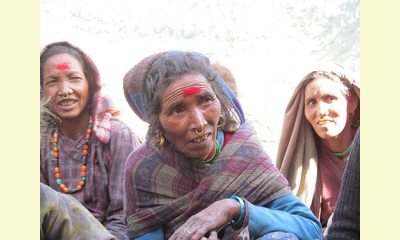|
|
Nepal's Truth and Reconciliation Commission: Myth or Reality?
un article par Prakash Khadka
Civil society organizations, human rights defenders,
advocates and conflict victims have together to
express their great concern over controversial
provisions the act for the TRC (the Truth and
Reconciliation Commission) and the Committee on
Enforced Disappearance. 
Women from a conflict-affected community in Jumla
click on photo to enlarge
The Act was passed in parliament by the support
from major political party’s whip in April 2014 that
provides power to grant amnesty even to those who
are involved in crimes under international law. The
Act also prohibits legal action in mediated cases,
does not recognize the rights of reparation and
promotes reconciliation on serious human rights
violations. Despite the appeal from the common
platform of victims, the President approved the Act
in May 2014.
The Act also has ruled out a verdict of Supreme
Court of Nepal and is being criticized by the UN High
Commissioner for Human Rights for breaching
international law.
It may be raised in the upcoming Universal Periodic
Review on Human Rights (UPR) at the United
Nations. Although the Human Rights Council is an
informal system where everyone can be involved
directly or indirectly its effectiveness depends upon
the power relation between nations, according to Mr.
Rabindra Bhattrai, a Nepali advocate.
Officials from Nepals's peace and reconciliation
ministry remained absent from the consultative
meeting, which expresses that they are oblivious to
what the UPR is all about.
On January 12, the Recommendation Committee
which is responsible for nominating chairs and
commissioners for the TRC announced a list of
candidates for public opinion. People can file via
District Peace Committees or District Administration
Office (DAO) in ten days.
Unfortunately, most of the victims reside in remote
areas that don’t have access of information in such
case. It is not possible to files complaints against
candidates, and it seems that this announcement
was done intentionally amidst the current tension of
the constitution assembly, said Mr. Suman Adhikari;
a conflict victim.
“We had very high expectation when the
Comprehensive Peace Accord was signed in 2006,
ever since lobby was started for a TRC, but many
things are being covered up”, he argued. A source
claimed that political parties have already proposed
their own candidate for chairmanship and for
commission members who will likely endorse finally.
Mr. Pradip Pokhrel; a member of committee, said
that it is hard to find non-political figures for civil
concerns; everybody is openly affiliated to a political
party and the TRC is influenced by those political
figures. According to him, people are deprived of
social and economic rights after the conflict in the
most remote areas.
A previous UPR seriously questioned the use of
impunity in Nepal where powerful perpetrator still
openly claim their deeds while the legal system is
unable to bring them to justice.
Relief packages that the government provides are
mostly being taken by fake victims on the base of
their political influence in the districts. A woman from
one village tells how she still can’t forget how she
was sexually treated, while the eyes of a daughter
whose father is still disappeared are not yet dried.
Members of destroyed family have not received
reparation.
Let there not be a miscarriage of justice; do not let
impunity over-rule human right.
|








|
DISCUSSION
Question(s) liée(s) à cet article:
Truth Commissions, Do they improve human rights?
* * * * *
Commentaire le plus récent:
The following is excerpted from an article by Ernesto Semán, professor at the University of Richmond in the U.S. He looks at the recent torture report to the U.S. Senate in the light of the history of U.S. implication in the torture that took place in previous decades in Latin America. As he points out, the torture is only the most recent expression of American policies that amount to a form of state terrorism.
. . . instead of accepting the significance of the war on terror in undermining the rule of law, the report has served the Obama administration as another component of an ideological spinning wheel. . ... continuation.

|
|









